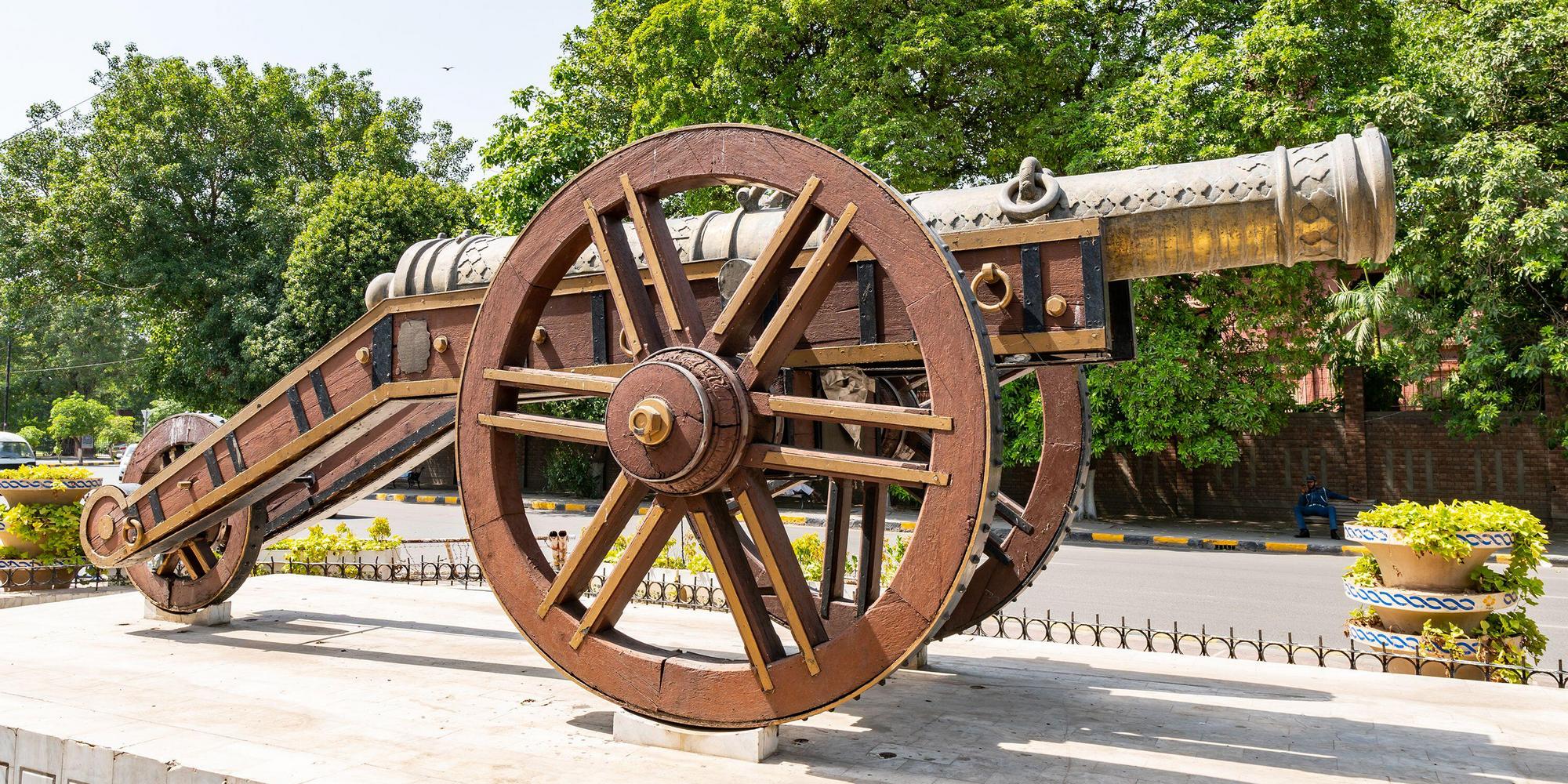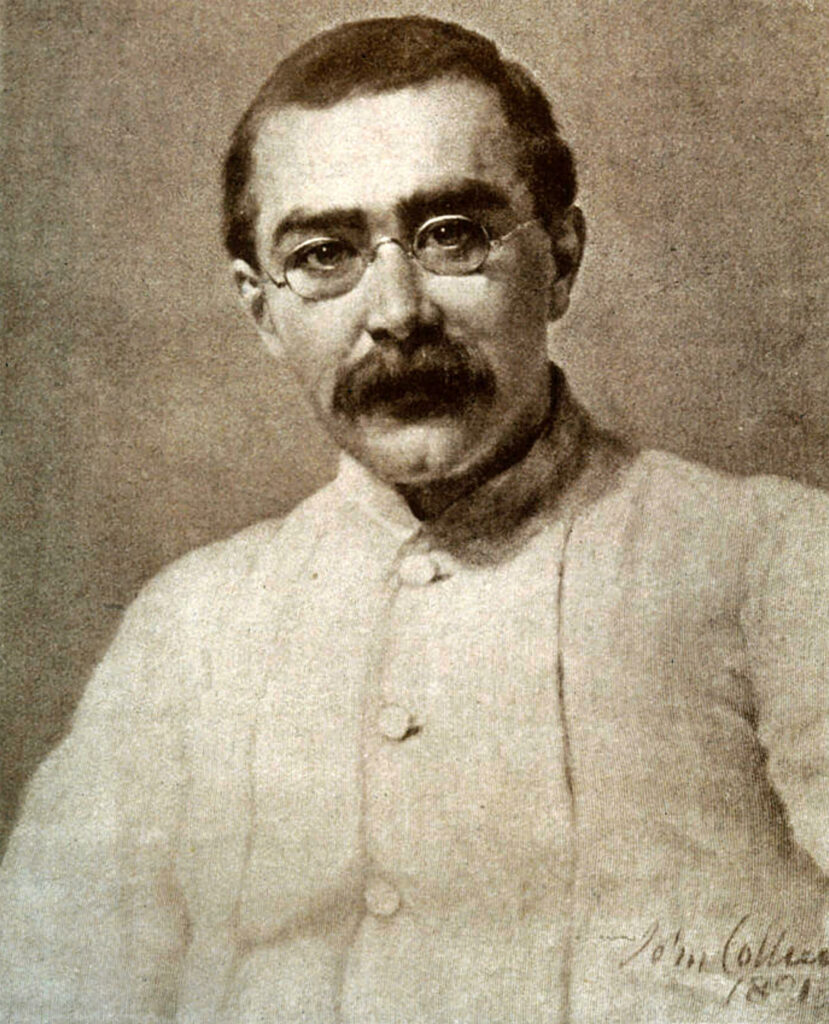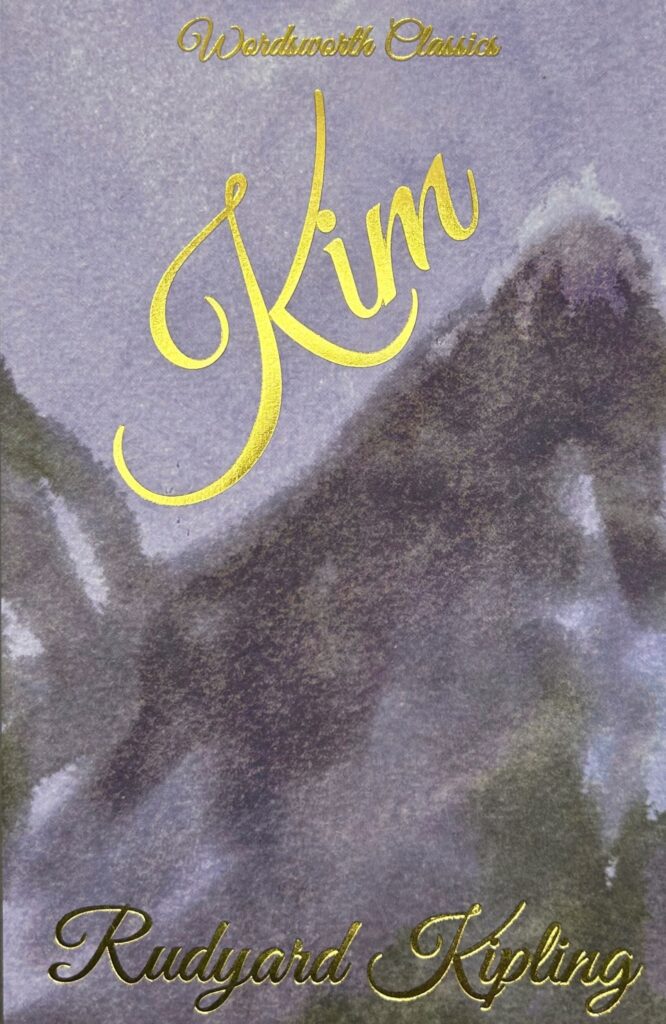
Sally Minogue looks at Kim
Sally Minogue continues her ‘Empire’ series, looking at Rudyard Kipling’s novel Kim and touching on some of his poetry.

Rudyard Kipling c. 1891
Rudyard Kipling has elements in common with my previous subject, Joseph Conrad, in spite of appearances to the contrary. ‘Rudyard’ was Kipling’s second given name (his first was Joseph), derived from Rudyard Lake in Staffordshire where his parents had done their courting. Impeccable English origins then; but in 1865 the newly-married couple moved to India, and their son was born, on the penultimate day of the same year, in Bombay where his father was Principal of the newly-founded School of Art. In ‘To the City of Bombay’, Kipling would describe it as ‘Mother of Cities to me’, and he was likewise ‘mothered’ by Indian servants and spoke what he called the vernacular (Hindustani) in his formative years. English was not, then, his mother tongue and England was not his mother country. From this culturally rich and unfettered early life, magnified and idealised in the freedoms of the young Kim, he was ripped untimely at the age of six (along with his sister Trix, only four) to be fostered and taught by a couple in Southsea, England. Their parents seem to have paid little attention to what their life might be like in that household, but Kipling afterwards referred to it as ‘the House of Desolation’, and in his retrospective memoir Something of Myself he recalled it with horror. At the same time, and characteristically, he put a positive spin on the ‘torture’ suffered there by suggesting that it hastened his development as a writer. He was removed from that small-scale imprisonment in 1877, to the larger-scale institutionalisation of the United Services College in Devon, devoted to preparing future Army officers. It was not until 1882, at the age of sixteen, that he was restored once more to his mother country. Thus, ‘I found myself at Bombay where I was born, moving among sights and smells that made me deliver in the vernacular sentences whose meaning I knew not’.[1]
I have described at some length this period in Kipling’s early life, because most commentators agree that it created a rupture in his identity which affected profoundly both his character and his writing. Jan Montefiore[2] characterises this via his poem ‘The Two Sided Man’ which first appears as an epigraph to Chapter 8 in Kim:
Something I owe to the soil that grew –
More to the life that fed –
But most to Allah Who gave me two
Separate sides to my head.
I would go without shirts or shoes,
Friends, tobacco or bread
Sooner than for an instant lose
Either side of my head. (Kim, 139)
It is in this respect that I link him with Conrad, both men identifying powerfully with two different nations, both brought up with one language and writing in another, the fracture in their lives at once concealed and revealed in their writing. Of course, Kipling subsumed his two identities much more determinedly – and he might have said naturally – into one, to the extent that as a writer he has been seen as the consummate voice of a particular sort of English identity. His experience of India, his at-homeness there, only added to his sense that he had the right to speak for and about it. And often that meant speaking in an imperialist voice. In this blog I want to give full weight to the harm that voice has done, whilst at the same time considering whether in Kim, Kipling can also offer us a unique understanding by showing us a world poised between the imperialist and the colonised point of view.
To begin with the worst then. I have just been listening to Inua Ellams giving his thoughts on Kipling in The Essay on Radio Three, a broadcast from May 17th 2022, available on BBC Sounds. Ellams is an acclaimed British poet and dramatist, his best-known work being Barber Shop Chronicles at the National Theatre. I was lucky to attend one of the performances – a brilliantly structured play, a completely different experience from standard theatre, one of the most engaged audiences I have ever been part of (including dancing!) and a rare majority non-white audience. Ellams begins his Essay by noting his early admiration for Kipling, whom he sees throughout as a fellow-poet. But his analysis of his poem ‘The White Man’s Burden’ is devastating, linking directly Kipling’s attitude in that poem with current Black Lives Matter concerns. In a poignant final passage, he imagines himself meeting Kipling as a fellow-poet. ‘To him I’d have been sub-human, “half-devil, half-child”’. In revenge he fantasises tipping over Kipling’s inkwell so that he might drown in it; the analogue is the blood of all those subjugated by Empire.
The great thing about Ellams’ piece is its complexity, combining respect for the poet’s influence, fury at that same influence, poignant and rather reluctant recognition that when Kipling described the ‘white man’s burden’, he meant him, Inua Ellams, and a beautifully judged poetic retribution for Kipling, drowning in his own ink. Ellams is intent to show that he is more than a match for Kipling. But there is more there too, a sort of sadness at his own understanding of what the words of this poem really mean. As with Chinua Achebe on Conrad, so with Ellams: unless we share the particular experience and oppression of racism, we cannot gainsay such a commentary. In the end, after all the finesse of his argument, Ellams can only say, ‘Fuck Kipling!’. His point is, I think, that nuance will not do; a brute rejection is all that can answer a brute racism. I can’t gainsay Ellams, but I do want to say more, in the same spirit in which Achebe believed that Conrad should still be read. I think that Kim (its first serial publication in 1900 coming just a year after the publication of Heart of Darkness), has much to tell us about imperialism, and even about India. Perhaps the racism itself is part of what these works have to tell us. We cannot simplify history by destroying its signs, any more than we can get rid of Colston’s or Rhodes’s influence by pulling down their statues. Kim, like Heart of Darkness, is part of the fabric of that history which will give us an insight into its workings.
I mentioned earlier that the novel Kim is poised between the imperialist and the colonised experience; central to this is the way in which its eponymous hero embodies not so much a divided identity but a multiple one. Chapter 8 to which ‘The Two Sided Man’ is epigraph, is, tellingly, the chapter where Kim is persuaded by Mahbub Ali to change his identity by ditching his Hindu turban (‘“I will change my faith and my bedding, but thou must pay for it”’):
At a shop on the outskirts of the city the change was made, and Kim stood up, externally at least, a Mohammedan. (139)

Sukh Mahal
But Kim has in any case been a Hindustani only for a short, opportunistic time, having persuaded a woman of ‘a certain house’ to disguise him so that he can escape the shackles of school (though he spins a different tale of romance to her). He abandons his white identity as swiftly as he abandons his ‘new bullock-trunk, marked “K. O’H”’, remarking ‘“Sahibs are always tied to their baggage”’. (135) Merrily ‘He gave the girl four annas, and ran down the stairs in the likeness of a low-caste Hindu boy – perfect in every detail.’ This chameleon ability of Kim’s is evidenced right at the start of the novel:
Though he was burned black as any native; though he spoke the vernacular by preference, and his mother-tongue in a clipped uncertain sing-song; though he consorted on terms of perfect equality with the small boys of the bazar; Kim was white – a poor white of the very poorest. (31)
Kim’s whiteness comes last on the list of the qualities that identify him, and though it’s made clear that his being white is a crucial distinction and empowerment, that is immediately qualified by what sort of whiteness it is – ‘a poor white of the poorest order’. Not to mention that he is not an English Sahib but an Irish one, an O’Hara – surely a deliberate choice by Kipling to displace Kim even further from the ruling class. Kim is constantly being reminded through the novel that he is a Sahib, but he doesn’t feel like a Sahib. On numerous occasions he rejects it as the final word on who he is. On the train to be schooled at St Xavier’s, in a second-class carriage, he reflects ruefully, ‘This solitary passage was very different from that joyful down-journey in third-class with the lama. “Sahibs get little pleasure of travel”, he reflected.’ (128) And when he is finally reunited with the lama he asserts that his role as a Sahib is set aside ‘when I come as thy disciple. I have accomplished the years appointed for a Sahib.’ ‘That night’, we are told, ‘he dreamed in Hindustani, with never an English word …’ (189)
These easy and sometimes manipulated slippages in Kim’s identity could be seen as a sign of untrustworthiness, but for him they are a natural part of his oneness with a multiple country and culture. He could never be singular: the multiplicity of India is his métier and milieu. When he finally finds the regiment of his father (the sign of the Red Bull which he has sought as intently as the lama has sought his River of the Arrow, the river of absolution), he sees almost immediately that he must escape it, and seeks the help of a letter-writer. He sends the lowly sweeper to find one: ‘“There is a white boy by the barracks waiting under the tree who is not a white boy”’ stammers the sweeper. And there we have it with Kim – a white boy who is not a white boy, a white boy who is also an Irish boy, who when he cleaves to his father’s Maverick regiment finds himself fettered, at any rate psychologically, to an outlying tree when before he had the run of the bazar, a chela who follows his lama whilst transmogrifying from Hindu to Mohameddan, a train/te-rain-traveller who speeds across boundaries. Nothing is fixed for Kim, except for his devotion to his lama. And to the lama he avows ‘we … are beyond all castes’ (193) – the Indian internal hierarchy rejected with the English imperial one.
This insistence on a personal freedom beyond any structures imposed from outside is reinforced by the peripatetic and picaresque structure of the novel, as Kim escapes one set of constraints after another, always trying to get back to his wanderings with the lama – who is genuinely unfixed from the material world. At several points on his journey, usually when he is in the rare condition of being alone, Kim reflects on his own identity:
‘No man can escape his Kismet. But I am to pray to Bibi Miriam, and I am a Sahib.’ He looked at his boots ruefully. ‘No; I am Kim. This is the great world and I am only Kim. Who is Kim?’ he considered his own identity, a thing he had never done before, till his head swam. He was one insignificant person in all this roaring whirl of India, going southward to he knew not what fate. (128)
He has almost exactly the same thoughts when he has finally rid himself of the responsibility of being a messenger in the Great Game:
All that while he felt … that his soul was out of gear with its surroundings – a cogwheel unconnected with any machinery, just like the idle cogwheel of a cheap Beheea sugar-crusher laid by in a corner. … ‘I am Kim. I am Kim. And what is Kim?’ His soul repeated it again and again. (263)
Even when he is reunited with the lama, and reflecting on his debt to him in understanding that this is ‘a great and wonderful world’, a sense of isolation haunts him: ‘“ and I am Kim – Kim – Kim – alone – one person – in the middle of it all.”’ (217)
These reflections occur often enough that we can’t see them as uncharacteristic, even though they sometimes seem at odds with the active, joyful boy careering through the pages we are reading. These passages are the closest Kipling gets to modernism in the novel, and while they touch on an existentialist angst, they spring more from Kim’s attempts to unify his many ‘selves’ in answer to a moment of self-doubt. This is again linked with his lama, and in a moving passage late in their journeying, a chastened Kim confesses all the ways in which he feels he has fallen short in his discipleship, until he ‘broke down and sobbed at the lama’s feet.’ (255) The lama in turn reassures him:
‘What a to-do is here!’ said the old man gently. ‘Thou hast never stepped a hair’s breadth from the Way of Obedience. Neglect me? Child, I have lived on thy strength as an old tree lives on the lime of a new wall. Day by day … I have stolen strength from thee. Therefore, not through any sin of thine, art thou weakened. It is the Body – the silly, stupid Body – that speaks now’. (255)
As this moving passage reveals, the heart of the novel is that it moves not from innocence to experience, but from innocence to innocence. Both the youthful Kim, for all his self-questioning, and his aged guide the lama, for all his spiritual musings, remain innocent throughout. The lama is allowed this because he has turned away from the world, Kim because he has not yet fully entered it. As the Sahiba says, ‘“Children together, young and old:”’ (256) There is something powerfully refreshing about this; as readers we are for once allowed to forget our knowing selves and go back to the simpler state of childhood, an idyll of freedom which must end once the novel ends. But while we are within it we are allowed, as Kim and the lama are finally, to be in a state of grace.
However, innocence is also ignorance, and wilful ignorance is a way of simply hiding from the truth. Characterising someone as a child is after all reducing them, as Inua Ellams points out in Kipling’s descriptors, ‘half-devil, half-child’. The constant presence of the Great Game and the way Kim is manipulated within it is another serious caveat. So is this just an imperialist fiction masquerading as a celebration of an idealised India with a white child gone native, and a lama in search of cod-enlightenment, bonding together like Huckleberry Finn and the runaway slave Jim, telling people like me what we want to hear? Maybe. Perhaps I am seduced by the cross-cultural idyll that Kim and the lama inhabit, (and that Huck and Jim do). This then is Kipling’s great imaginative strength as a writer, as it is the great strength of all writers – to lead us into a world which makes its own sense. Kim is certainly a whole and persuasive world. While we are in it we are at one with it. Meanwhile the discourse of decolonisation in literature also demands that we step outside it, with Ellams, and see it critically. I would still argue that Kipling’s creation of the engagingly myriad Kim inherently questions the monolith of imperialism. But of course, as an imperialist, he was in a position to do that.
Page references are to the Wordsworth edition of Kim. Poems quoted can be found in the Wordsworth edition of The Collected Poems of Rudyard Kipling. Wordsworth also publish several other Kipling
[1] Something of Myself, which was published posthumously.
[2] Jan Montefiore, Rudyard Kipling, Northcote/British Council, 2007, p. 2
Main Image: Zamzama Gun (or Kim’s Gun) Lahore, Pakistan Credit: AlexelA / Alamy Stock Photo
Image 1 above: Rudyard Kipling c.1891 Credit: Pictorial Press Ltd / Alamy Stock Photo
Image 2 above: Sukh Mahal, where Kipling wrote Kim Credit: Pictorial Press Ltd / Alamy Stock Photo
Books associated with this article
